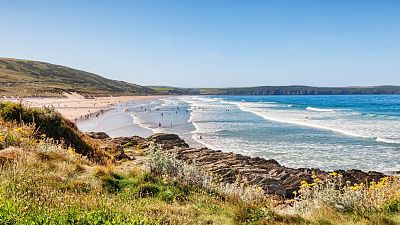This unexpected British coastline has just become a world-class surfing destination

Australia’s Gold Coast, California’s Santa Cruz and Peru’s Huanchaco have all won the title of ‘World Surfing Reserve’ in recent years. While these might be the locations that come to mind when you think of sun, sea and riding the waves – this year the winner is slightly more unexpected.
Britain’s north Devon coast has been selected to join the list in 2022.
Becoming the UK’s first World Surfing Reserve (WSR), and the 12th globally, the area in the south-west of England has now been officially recognised by the Save the Waves Coalition. It bases its decision on the quality of surfing in nominated locations, as well as the sport’s relevance in the wider community.
Launched in California in 2009, the programme aims to ‘protect surf ecosystems around the globe’, and sees north Devon as having great potential.
A hub of biodiversity
Known for its dense variety of outstanding surf, north Devon has locations like Saunton and Woolacombe, both famous for their stunning beaches and diverse surf swells, meaning the waves in these environments are suitable for “beginner to expert and [offer] a variety of surfing styles,” according to WSR. The spot is also the first true cold water reserve in the world.
The north Devon coast is no stranger to awards, already honoured and protected with the title of Area of Outstanding Natural Beauty. It is also home to Braunton Burrows, a UNESCO Biosphere, which aims to create conditions for people and nature to thrive together.
Surfing for future generations to come
Kevin Cook, a surfer from the north Devon area, was the first to propose the idea of north Devon becoming a potential reserve.
Concerned about water pollution, he hopes that this international recognition will “help influence” decision-makers and protect the landscape for generations to come.
The impacts of climate change and persistent problems with local sewage overflow, as well as encroaching development on open coastal spaces, has resulted in fear around the future of north Devon’s landscape.
“Our water quality is good but it could be better and we need that extra spending on infrastructure by water companies to make sure we are not tarnishing the future,” says Kevin.
Co-founder of the Surfing Reserve in north Devon, Adam Hall, adds, “Our core focus is looking after the quality of the waves themselves and preserving the ecosystems that produce them.”
Hall thinks there is a need for surf spots to be recognised, celebrated and protected in the same way national parks are.
